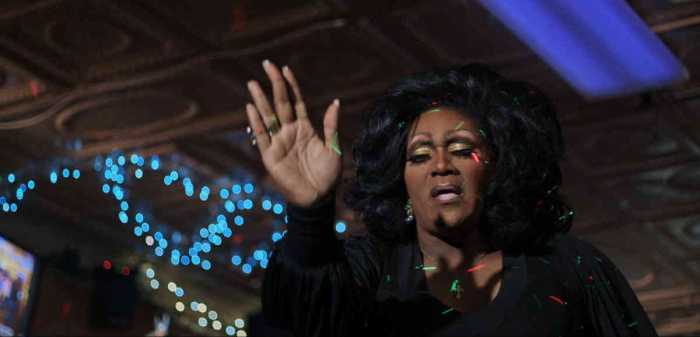Adel Karam and Kamel El Basha in Ziad Doueiri’s “The Insult.” | COHEN MEDIA GROUP
“I wish Ariel Sharon had wiped you all out.”
That sentence, initially delivered in anger by a Lebanese Christian man, Tony (Adel Karam), to a Palestinian refugee, Yasser (Kamel El Basha, who is also a director and playwright), gets repeated at least two dozen times in Ziad Doueiri’s film “The Insult.”
The hatred between the two initially began with Tony’s attempt to ignore Yasser telling him he needs to repair a drainpipe on the garage the Christian man owns. It spirals into an incident that leads to political discussions on TV, a lengthy court battle, and street demonstrations. The personal becomes political to an extent that turns ludicrous, but then Lebanon is a country that’s still officially at war with Israel, making Tony’s remark something more than a casual dig.
Ziad Doueiri looks at the anger still poisoning Lebanese life
Doueiri has personally suffered the consequences of similar political posturing after shooting much of his last film, “The Attack,” in Israel. One would think that a dark exploration into the alienation of “assimilated” Arabs who live in Israel would honor the spirit of the Boycott, Divestment, and Sanctions movement, if not its exact demands, but Doueiri has bizarrely been accused of glorifying Zionism with it. This experience, although never directly referred to in “The Insult,” seems to have fueled its view of the absurdity of Middle Eastern politics.
Having come to the US to go to film school and then worked as a camera assistant on Quentin Tarantino’s first three films, Doueiri has only made four features in 20 years. “The Insult” marks his return to directing in his native Lebanon after his 1998 debut, “West Beirut.” To a large extent, that film, set during the country’s civil war, told the story of his adolescence, although the Muslim director has said that he only began to fully recognize the humanity of Jews and Christians upon his arrival in America. He has co-written the scripts of his three subsequent films with a Christian Lebanese woman, Joelle Touma.
“The Insult” is grounded in seemingly local issues; its narrative ultimately depends on a return to wounds created by the civil war and calls for a re-examination of its events. However, given the extent to which the entire Middle East often feels like a tinderbox, its tentative optimism resonates.
Very overtly, “The Insult” explores anger. It’s a revenge fantasy of sorts, but one that plays out the full consequences of that vengeance. Yasser answers Tony’s words with fists, breaking several of his ribs in response to his anti-Palestinian comments. When this winds up in court, both men hire female lawyers. Their testimony often plays in relatively long takes that turn from medium shots into close-ups without any cuts. Doueiri and cinematographer Tommaso Fiorilli’s camera is fairly mobile. But the film suffers from its inability to dial down its emotional temper. Once the rage gets boiling, it seems content to have various characters repeat the sentence I quoted at the beginning of this review and shout a lot.
“The Insult” aims to take the pulse of Lebanese society, particularly its inability to integrate Palestinians and come to terms with the scars left by its civil war and its free-floating hatred of Israel, which ventures from a justifiable anger at that nation’s government into anti-Semitism. Doueiri uses the format of the courtroom drama as his entry point. Before the film’s first half hour is up, Tony and Yasser have had their first confrontation before the law, but much more will follow.
Sidney Lumet seems like a major influence on Doueiri, but as Canadian critic Adam Nayman has observed, the Lebanese director seems to want to reach international audiences with the specificities of his country’s political problems. In fact, the film’s press kit asks Doueiri whether he thinks audiences outside Lebanon will understand the film. (Its American distributor, the Cohen Media Group, which also owns the Quad, the theater showing it in New York, invested some money in its production, so it certainly thinks so.) The very fact that “The Insult” is being released in the US at a time when American interest in subtitled film is sinking lower and lower suggests a welcome respect for our ability to care about the subtleties of conflict between Palestinians and ethnic Lebanese. I wouldn’t take that ability for granted.
At the same time, Nayman is also right to suggest that the metaphorical and political dimension of “The Insult” works better than smaller details like fathers facing off against their daughters on opposite sides of legal teams. There’s a tendency for the film to play like a state-of-the-nation address more than the drama about two men where it began. Its heart seems closer to the courtroom than the working-class environs where Tony works (and it never takes us to Yasser’s refugee camp, for some reason). Still, if “The Insult” sometimes feels like a Lebanese version of a TV legal drama, it’s a very trenchant and well-executed one.
THE INSULT | Directed by Ziad Doueiri | Cohen Media Group | In Arabic with English subtitles | Opens Jan. 12 | Quad Cinema, 34 W. 13th St. | quadcinema.com




































